
California has passed four bills in recent years concerning access to the U visa, an important form of immigration status. Although the federal government decides who receives a U visa, the state can increase access to the remedy by creating processes for noncitizens to obtain a U visa certification from law enforcement, a necessary part of the U visa petition. All of the bills address U visa certification. This advisory describes the California bills, who they apply to, and how practitioners can use them to advocate for U visa clients.
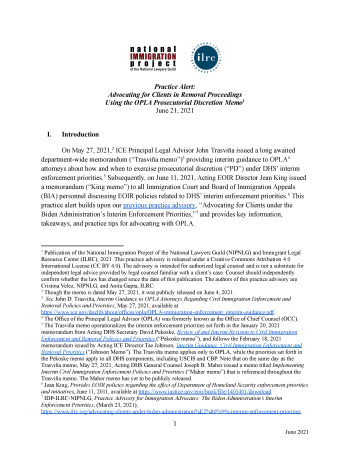
ICE enforcement priorities have changed under the Biden administration, signaling a return to the use of prosecutorial discretion. On May 27, 2021, the ICE Principal Legal Advisor issued guidance for OPLA attorneys about how and when to exercise prosecutorial discretion during various stages of removal proceedings. EOIR subsequently issued its own memo discussing EOIR policies related to the enforcement priorities. Building upon our previous practice advisory, Advocating for Clients under the Biden Administration’s Interim Enforcement Priorities, this practice alert from ILRC and NIPNLG provides immigration practitioners with a summary of the OPLA and EOIR guidance, including key information, practice tips, and takeaways.
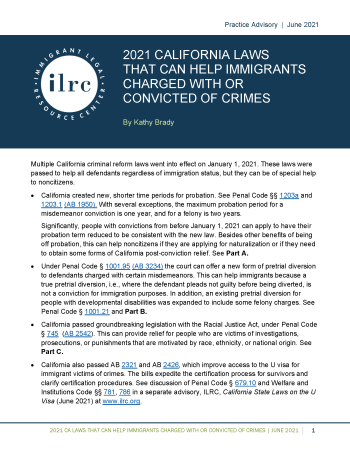
On January 1, 2021, multiple California criminal reform laws took effect. These laws were passed to help all defendants regardless of immigration status, but they can be of special help to noncitizens. Advocates should understand how these laws may help a client’s immigration case. They include:
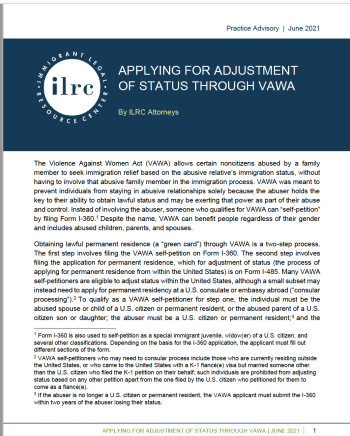
The Violence Against Women Act (VAWA) allows certain noncitizens (regardless of gender) abused by a family member to seek immigration relief by "self-petitioning" based on the abusive relative's immigration status, without having to involve that abusive family member in the immigration process, and based on that VAWA designation, apply for lawful permanent resident status (a "green card"). Obtaining lawful permanent resident status through VAWA is generally a two-step process: one, filing the VAWA self-petition and two, filing the application for adjustment of status based on VAWA. This practice advisory goes through the second step, filing an adjustment application based on VAWA. VAWA adjustment applicants have slightly modified requirements from other family-based adjustment applicants, including less rigorous general requirements and certain special exceptions and waivers to some of the grounds of inadmissibility.

Most H-4 spouses of H-1B nonimmigrants are ineligible for employment authorization and thus are financially dependent on the principal visa holder spouse. This dependence can be used as a tool for abuse and control in relationships and exacerbate domestic violence situations. INA § 106 allows survivors of domestic violence who are spouses of certain nonimmigrant visa holders to be eligible for work authorization independent of their spouse. This advisory provides an overview of employment authorization eligibility under INA § 106 for H-4 spouses of H-1B visa holders who are survivors of domestic violence.
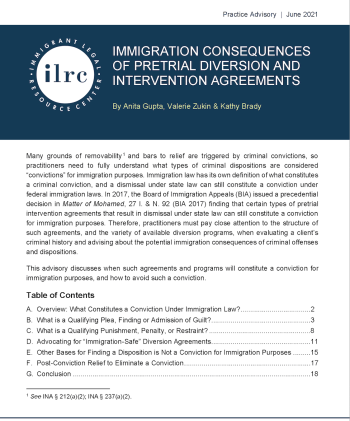
Immigration law has its own definition of what constitutes a criminal conviction. The Board of Immigration Appeals (BIA) and other courts have held that certain types of pretrial diversion and intervention agreements that result in dismissal under state law can still constitute a conviction for immigration purposes. Practitioners must pay close attention to the structure of such agreements, and the variety of available diversion programs, when evaluating a client’s criminal history and advising about the potential immigration consequences of criminal offenses and dispositions. This advisory discusses when such diversion agreements and programs will constitute a conviction for immigration purposes, strategies to avoid triggering an immigration conviction, and tips for advocating for “immigration-safe” agreements.
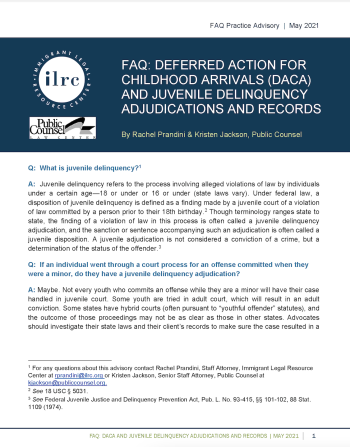
In this practice advisory co-drafted with Public Counsel, we answer common questions on how to tackle disclosure of juvenile adjudications and dissemination of court records for individuals interested in applying for DACA. It also includes a sample DACA request packet, which shows various ways to disclose juvenile adjudications and comply with state confidentiality laws.
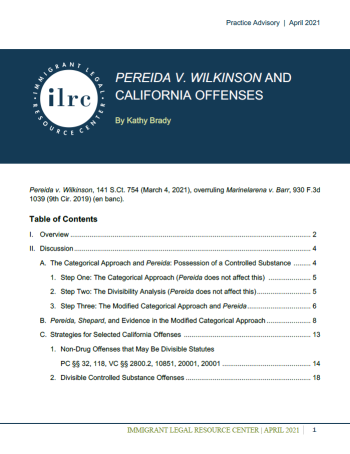
In Pereida v. Wilkinson, 141 S.Ct. 754 (March 4, 2021), the Supreme Court issued another opinion on the categorical approach, which is the analysis authorities use to decide whether a criminal conviction triggers removal grounds. Pereida focuses on the “modified” categorical approach, which is how courts approach a conviction under a statute that sets out multiple, separate, offenses (a “divisible” statute). Pereida overruled Marinelarena v. Barr, 930 F.3d 1039 (9th Cir. 2019) (en banc).
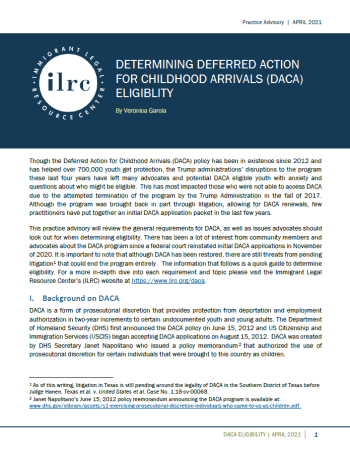
This practice advisory reviews the general eligibility requirements for DACA, as well as issues advocates should look out for when determining eligibility. There has been a lot of interest from community members and advocates in the DACA program since the program was reinstated by a federal court for DACA initial applications in November of 2020. This advisory offers information to guide advocates as they determine eligibility.
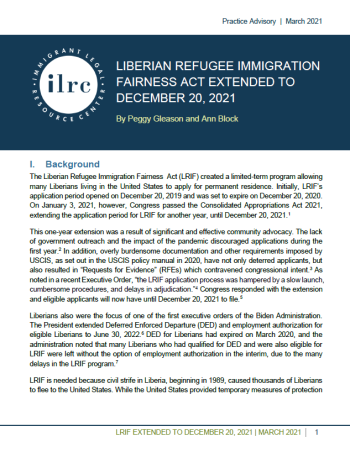
The Liberian Refugee Immigration Fairness Act (LRIF) created a limited-term program allowing many Liberians living in the United States to apply for permanent residence. Initially, LRIF’s application period opened on December 20, 2019 and was set to expire on December 20, 2020. On January 3, 2021, however, Congress passed the Consolidated Appropriations Act 2021, extending the application period for LRIF for another year, until December 20, 2021.